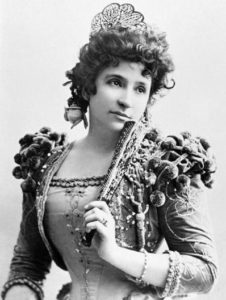
Artist Profile: Nellie Melba, The Biggest Star Before Caruso
By Gillian ReinhardDuring the early twentieth century, Australian soprano Nellie Melba was one of the most in-demand singers in the world.
Born May 19, 1861 as the eldest of seven children, Helen Porter Mitchell eventually adopted the name “Melba” in honor of her hometown, Melbourne. She studied music in Paris and debuted at La Monnaie in 1887 as Gilda in “Rigoletto.” After a lukewarm reception in “Lucia di Lammermoor” at Covent Garden, Melba initially swore off London, though she later identified it as her “artistic home.”
By the end of the nineteenth century, Melba had performed in opera houses across Europe and at the Met in New York.
Off stage, Melba engaged in a publicized affair with the Duke of Orléans and inspired several dishes by the chef Auguste Escoffier, including Peach Melba and Melba toast.
Throughout her life, Melba remained loyal to audiences in Australia, where she fundraised for the WWI effort and was named a Dame Commander of the Order of the British Empire in 1918. She died in Melbourne in 1931, aged 69.
Signature Roles
Melba was known for a limited (and sometimes predictable) repertoire, with only about ten regular roles. She began her career singing Verdi, including “Rigoletto” and “La Traviata.” Though criticized for her inability to pronounce French, composer Leo Delibes remarked that he did not care if Melba sang French or Chinese.
Melba championed “La Bohème” and studied the role of Mimi closely with Puccini. In 1902, she sang “Bohème” opposite Enrico Caruso at Covent Garden, which began a close association between the two singers. Her tombstone in Australia reads “Addio, senza rancore (farewell without bitterness)—” Mimi’s famed words to Rodolfo in “La Bohème.”
Watch & Listen
Here are some excerpts of the famed soprano in music by Puccini and Verdi.
Categories
Opera Wiki

